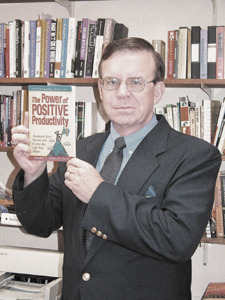AN INTERVIEW WITH AUTHOR DENNIS E. HENSLEY
 Fort Wayne author Dennis E. Hensley can best be described as a writer’s writer. Hensley is the author of more than 50 books and 3,000 articles. His work includes fiction—The Gift—as well as nonfiction—How to Write What You Love and Make a Living from It and The Power of Positive Productivity. An expert on the writings of American author Jack London, Hensley published an annotated edition of London’s Martin Eden in 2006. Hensley holds four university degrees, including a Ph.D. in literature and linguistics from Ball State University. A professor of professional writing at Taylor University in Upland, Indiana, Hensley serves as the director of the university’s professional writing program.
Fort Wayne author Dennis E. Hensley can best be described as a writer’s writer. Hensley is the author of more than 50 books and 3,000 articles. His work includes fiction—The Gift—as well as nonfiction—How to Write What You Love and Make a Living from It and The Power of Positive Productivity. An expert on the writings of American author Jack London, Hensley published an annotated edition of London’s Martin Eden in 2006. Hensley holds four university degrees, including a Ph.D. in literature and linguistics from Ball State University. A professor of professional writing at Taylor University in Upland, Indiana, Hensley serves as the director of the university’s professional writing program.
What is your approach to writing?
I take two different approaches, depending on whether I am writing nonfiction or fiction. For nonfiction, I do lots of research and outlining. The process is more functional and procedural. When I write fiction, I often talk out scenes and parts. It’s like a drama being acted out. I make a few notes but, generally, I ask whether what I’ve written sounds like a story, whether it has the rhythm and pace of a story, and whether it has the narrative drive—or momentum—of a story. If the writing doesn’t sound like a story, then I know it won’t work. I’m a storyteller, so if I’m writing a story I pretend that I’m sitting down with someone and telling the story.
Do you write for a certain amount of hours each day or do you try to write a certain number of words?
I usually write based on the assignment I have at the moment. I look at my deadline and note when the assignment has to be finished. So, if I have to sit at my desk all day to finish two columns on deadline, then I will sit at my desk until I’m finished. If I don’t have a pending deadline, I usually spend two hours each day at my desk and work on the next phase of my project. I might finish only two pages during those two hours, but I don’t berate myself because I finished just two pages. When I was working on my doctorate at Ball State, I also worked as a reporter for the Muncie Star newspaper, so my experience there was a good training ground, and it put me in a mode to think about closure. Closure was my word when I worked as a reporter, and it continues to guide my work as an author. You have to finish manuscripts.
Do you ever develop writer’s block?
I don’t believe in writer’s block. I think there are times when you write yourself into a corner, or maybe it’s a writer’s lack of technique. There are times, however, when writer’s block develops if I’m working on an article and I have to wait for someone to call me back or send me an email. That’s a time when I’m blocked. It’s not that I can’t write, but I don’t have the material that I need. The person I need the material from may be out of the office or on vacation, but I can direct myself in another way.
Now there are times when I don’t have the resolution to a story, but I don’t consider that to be writer’s block. Maybe my story doesn’t end the way I think it should, but at that point, I take time to process the ending by thinking about it or sleeping on it. I look at that break as a time when the project is a work in progress. Writers don’t just come up with brilliant ideas as they write. They have to take time to juggle ideas and feed information.
You have been writing for many years, so how has your writing changed from when you first started?
Actually, my reading habits have changed. When I was younger, I enjoyed reading lots of short stories, magazine articles, and newspaper articles. Now that I’m older I’m going in the other direction, and I’m reading longer works that aren’t necessarily the master classics like the books that I read in high school by Shakespeare, Dickens, the Brontës, and others, but they’re still high-quality books. By reading these books, I gain new perspectives and understand different styles of expression and writing. So, as my reading interests have changed, I have grown and my writing has matured. As an artist, I always hope that I can expand my skills and see my surroundings in new ways, which will help me express my thoughts in new ways.
What advice do you give your students and beginning writers about the writing process?
First, I tell them to become good time managers. If you make your writing a priority, you’ll succeed as a writer. You can’t play video games for hours or sit around watching reruns of movies that you’ve already seen if you want to become a writer. You have to learn to say no to certain things. There are enough hours in a day to set aside time to write, but you must be willing to establish priorities.
The second piece of advice I give my students is that they have to balance their lives with training and the actual doing. Writers can go to dozens of writers’ workshops and read numerous books about writing, but until they actually sit down and start writing, they will not learn how to write. That’s because as a writer you have to make mistakes. You have to go back and edit your work, and you need people to look at your work and give you feedback. So, the writing is as much a learning process as is what you are learning from your teachers. Again, if you want to become a writer, you must write.
- Shamrock Search Leads To Adventures In Waynedale - March 29, 2024
- Take A Journey Back To The Hundred Acre Wood - March 29, 2024
- Recognizing Green Book Sites In Indiana - March 29, 2024


